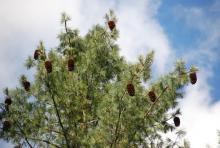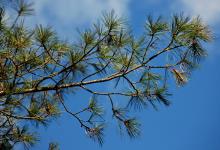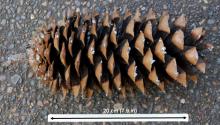Pinus lambertiana
Common name:
Sugar Pine
Pronunciation:
PI-nus lam-bert-i-A-na
Family:
Pinaceae
Genus:
Type:
Conifer
Native to (or naturalized in) Oregon:
Yes
- Conifer, evergreen, the tallest pine (The King of Pines), 150 to over 200 ft (45-61 m) high, straight trunk free of branches much of its length, open crown, nearly horizontal branches. Bark of young trees is thin, grayish-green, and smooth; on old trees it is reddish, with narrow, broken, scaly ridges separated by deep furrows. Needles, 5 per bundle, 5-10 cm long, twisted, slender, stiff, sharp-pointed, white lines of stomatal bloom on all surfaces; persist 2-3 years. Cones are large, 28-46 cm long, sometimes to as long as 56 cm (22 inches), cylindrical, shiny brown, on a long stalk.
- Sun to light shade.
- Hardy to USDA Zone 6 Native to north-central Cascade Mountains in Oregon (Santiam Pass), southward through the Sierra Nevada Mountains of California and extreme western Nevada, also found in northern Baja California, elevation range from 2,000-9,000 ft. It was discovered for science by David Douglas (1799-1834), the famous Scottish plant collector, in the Oregon's Umpqua River Valley in October, 1826.
-
Can you identify these common Oregon native 2-, 3-, and 5-needle pines?
- lambertiana: named by David Douglas to honor Aylmer Bourke Lambert (1761-1842), an English botanist who specialized in research on pines, author of the A description of the genus Pinus (1803). Douglas named the pine to honor Lambert befor he actually saw it. See The Discovery of Sugar Pine.
- The common name, Sugar Pine, is a reference to the sweetish resin that exudes from cut or burned heartwood. Native peoples used the large, rich, oily seeds of Sugar Pine as a food source and the sugary sap exuded from wounds as both food and medicine, the sap has laxative properties. The sweet exudate is pinitol, a methyl ester of a sugar alcohol namely, 3-O-methyl-D-chiro-inositol, it is now known to have "insulin sensitizing characteristics" and is obtained from soybean for commercial uses.












